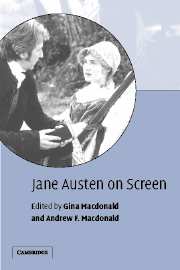Book contents
- Frontmatter
- Contents
- List of illustrations
- List of contributors
- Acknowledgments
- Introduction
- 1 Short “Takes” on Austen: summarizing the controversy between literary purists and film enthusiasts
- 2 Janeite culture: what does the name “Jane Austen” authorize?
- 3 “Such a transformation!”: translation, imitation, and intertextuality in Jane Austen on screen
- 4 Two Mansfield Parks: purist and postmodern
- 5 Sense and Sensibility in a postfeminist world: sisterhood is still powerful
- 6 Regency romance shadowing in the visual motifs of Roger Michell's Persuasion
- 7 Filming romance: Persuasion
- 8 Emma, interrupted: speaking Jane Austen in fiction and film
- 9 Reimagining Jane Austen: the 1940 and 1995 film versions of Pride and Prejudice
- 10 Emma and the art of adaptation
- 11 Clues for the clueless
- Questions for discussion
- Filmography
- Bibliography
- Index
11 - Clues for the clueless
Published online by Cambridge University Press: 05 June 2012
- Frontmatter
- Contents
- List of illustrations
- List of contributors
- Acknowledgments
- Introduction
- 1 Short “Takes” on Austen: summarizing the controversy between literary purists and film enthusiasts
- 2 Janeite culture: what does the name “Jane Austen” authorize?
- 3 “Such a transformation!”: translation, imitation, and intertextuality in Jane Austen on screen
- 4 Two Mansfield Parks: purist and postmodern
- 5 Sense and Sensibility in a postfeminist world: sisterhood is still powerful
- 6 Regency romance shadowing in the visual motifs of Roger Michell's Persuasion
- 7 Filming romance: Persuasion
- 8 Emma, interrupted: speaking Jane Austen in fiction and film
- 9 Reimagining Jane Austen: the 1940 and 1995 film versions of Pride and Prejudice
- 10 Emma and the art of adaptation
- 11 Clues for the clueless
- Questions for discussion
- Filmography
- Bibliography
- Index
Summary
Incidentally, this outdated method of bringing all esthetic possibilities to the level of one's own little conceptions and capacities … is very amusing in the argumentation of some modern American critics.
Vladimir Nabokov's Nikolai GolgolBesides providing a certain level of intellectual entertainment, the primary objective of good adaptation, like that of any good interpretative reading of a text, is to make viewers return to the text and reconsider it anew. Probably the most successful adaptations of literature to film are those which cause the viewer to conclude, after having returned to the text and evaluated the reading that the film has delivered, that the filmmakers have a point, an interpretation which deserves a hearing. This interpretation need not be all-inclusive, for the compressed length of a film does not permit comprehensive coverage, nor does the nature of the medium. However, it must carry insights that together provide a valid understanding of the original text.
The list of points or understandings encompasses all types of insights, many of which are personal. Friedrich Dürrenmatt's Der Richter und Sein Henker (1961) made so enormous an impression on me when I first read it that it is the only book from my college years that I still possess. However, until I saw Maximillian Schell's adaptation of it, End of the Game (1976) – in which the author himself appears – I had no idea just how blackly comic the novel was, most notably the funeral in the rain, whose multiple comic possibilities Schell brings to the screen.
- Type
- Chapter
- Information
- Jane Austen on Screen , pp. 228 - 253Publisher: Cambridge University PressPrint publication year: 2003
- 2
- Cited by



